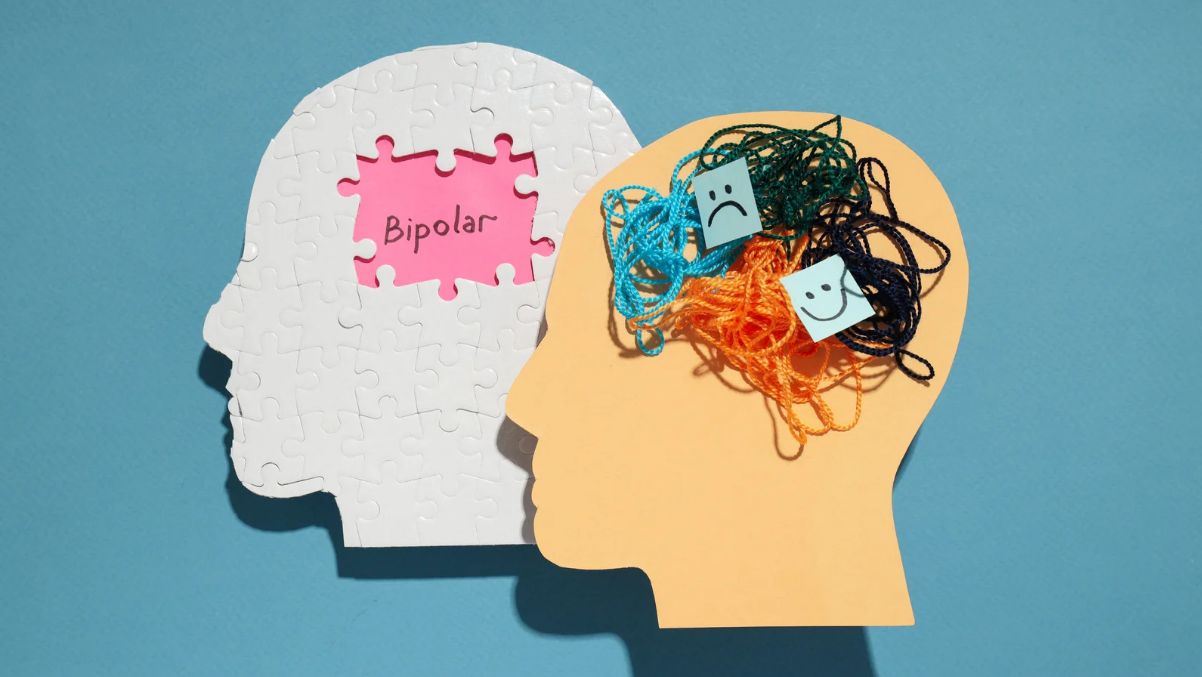Bipolar disorder is a serious mental health condition that affects millions of people worldwide. Characterized by extreme shifts in mood, energy, and behavior, it can dramatically alter a person’s ability to function in daily life. Despite growing awareness about mental health, misconceptions about bipolar disorder remain widespread. These myths don’t just misinform—they actively harm those living with the condition by contributing to stigma, shame, and delays in diagnosis and treatment.
In this blog, we’ll explore common myths about bipolar disorder, how they damage mental health awareness, and what the truth really is. By challenging these harmful narratives, we can build a more informed, compassionate society that supports those with bipolar disorder rather than marginalizing them.
What is Bipolar Disorder

Bipolar disorder is a mental health condition marked by extreme mood swings that include emotional highs (mania or hypomania) and lows (depression). During manic phases, individuals may feel euphoric, energized, or unusually irritable. In contrast, depressive episodes bring sadness, hopelessness, and fatigue. These shifts are more intense than everyday ups and downs and can disrupt daily life, relationships, and decision-making. Bipolar disorder is not a character flaw—it’s a brain-based medical condition that can affect anyone. With the right treatment, including therapy, medication, and support, individuals with bipolar disorder can manage their symptoms and lead fulfilling, productive lives.
Why Myths About Bipolar Disorder Are Harmful

Believing myths about bipolar disorder does more than spread misinformation—it causes real harm. These misconceptions fuel stigma, delay treatment, strain relationships, and block support.
The spread of misinformation has real-world consequences:
- Stigma and Shame: People living with bipolar disorder often internalize negative stereotypes, which can prevent them from seeking help.
- Misdiagnosis and Delayed Treatment: Believing myths can lead individuals and even healthcare providers to miss important signs or dismiss symptoms.
- Relationship Strain: Loved ones who don’t understand the disorder may misinterpret behaviors, causing tension and lack of support.
- Workplace Discrimination: Stereotypes can influence employers’ perceptions, affecting job opportunities and career advancement.
When we dismantle these myths, we create safer spaces for people to talk about their mental health and get the help they deserve.
Myth 1: Bipolar Disorder Just Means Mood Swings
Reality: While mood changes are a hallmark symptom, bipolar disorder is much more than just feeling happy one moment and sad the next. The condition involves severe, often debilitating episodes of mania or hypomania (elevated mood, hyperactivity, impulsivity) and depression (low energy, sadness, withdrawal). These episodes can last for days, weeks, or even months.
There are also different types:
- Bipolar I: Includes manic episodes that last at least 7 days, often with depressive episodes.
- Bipolar II: Characterized by hypomanic and depressive episodes.
- Cyclothymia: Involves fluctuating periods of hypomania and mild depression.
Understanding this complexity is crucial to recognizing how serious and disruptive bipolar disorder can be.
Myth 2: People With Bipolar Disorder Are Always Either “High” or “Low”
Reality: Many people with bipolar disorder experience periods of stability between episodes. These “euthymic” phases are times when mood is balanced, and individuals can lead completely normal lives.
With proper treatment and support, people with bipolar disorder can go months or even years without an episode. It’s not a constant cycle of extremes, and it doesn’t define someone’s entire identity.
Myth 3: Mania Is Fun and Harmless
Reality: Mania can sometimes feel euphoric or energetic, but it often comes with serious consequences. During manic episodes, people may:
- Spend impulsively
- Engage in risky behavior (driving recklessly, substance use, unsafe sex)
- Experience racing thoughts, delusions, or hallucinations
These behaviors can damage relationships, finances, and safety. Mania is not just “being in a good mood”; it’s a dangerous state that needs medical attention.
Myth 4: People With Bipolar Disorder Are Violent or Dangerous
Reality: This is one of the most damaging myths. Research shows that people with bipolar disorder are more likely to be victims of violence than perpetrators.
The idea that mental illness equates to violence is fueled by media portrayals that are dramatic but inaccurate. In reality, people with bipolar disorder are usually deeply introspective, sensitive, and struggling with inner turmoil, not aggression.
Myth 5: Medication Alone Can Cure Bipolar Disorder
Reality: Medication is often essential, but it’s not a magic bullet. Successful treatment typically involves a multi-faceted approach:
- Psychotherapy (like CBT)
- Lifestyle changes (sleep, nutrition, stress management)
- Support systems (family, peer support, community care)
Long-term stability comes from understanding triggers, developing coping skills, and maintaining consistent care.
Myth 6: You Can Always Tell When Someone Has Bipolar Disorder
Reality: Bipolar disorder doesn’t have a “look.” People may function well at work, maintain relationships, and appear fine while still battling internal chaos.
Symptoms can be subtle or masked. Misunderstanding this leads to harmful assumptions and missed opportunities for early support.
Myth 7: You Can Just “Snap Out of It”
Reality: Bipolar disorder is a medical condition, not a choice or a lack of willpower. Telling someone to just “cheer up” or “try harder” invalidates their experience and can deepen their shame.
Recovery is a process that involves professional help, patience, and understanding—not forced positivity.
The Role of Media and Misinformation

Popular culture often depicts bipolar characters as volatile, untrustworthy, or unstable. This one-dimensional storytelling fuels fear and misunderstanding, shaping how society views—and mistreats—those living with the disorder.
Examples:
- Characters switching moods suddenly with no explanation: TV shows and movies often dramatize bipolar disorder by showing extreme mood swings that happen out of nowhere. This portrayal skips over the nuance of how episodes actually unfold, making the condition look erratic rather than cyclical or patterned.
- Labeling anyone emotionally reactive as “so bipolar”: The misuse of the term in casual speech turns a real diagnosis into a personality insult. It not only minimizes the seriousness of the disorder but also increases shame for those managing it daily.
These portrayals erase the real complexity of the condition and devalue those living with it. Bipolar disorder is not just about emotions—it’s about energy levels, sleep patterns, decision-making, and the long journey of treatment and stability.
Educating the public and advocating for accurate representation is a powerful way to combat these myths. Real people deserve real stories—ones that reflect their strength, their struggles, and their full humanity.
How to Support Mental Health Awareness the Right Way

Supporting mental health awareness isn’t just about sharing posts or using hashtags—it’s about showing up with empathy, listening without judgment, and taking real action. When done right, awareness leads to understanding, reduces stigma, and creates safer spaces for everyone to seek help, heal, and feel seen.
- Educate Yourself: Learn about bipolar disorder from reputable sources like NAMI or the National Institute of Mental Health.
- Use Respectful Language: Say “a person with bipolar disorder” rather than “a bipolar person.”
- Be a Safe Space: Listen without judgment. Ask how you can help.
- Challenge Stereotypes: Correct misinformation when you hear it.
- Promote Early Intervention: Encourage loved ones to seek help at the first signs of mental distress.
When to Seek Help
Recognizing when to seek help for bipolar disorder is crucial. If mood swings start to feel unmanageable, disrupt daily life, or lead to risky behavior, it’s time to talk to a mental health professional. Other red flags include extreme highs or lows lasting for days, sleep problems, difficulty concentrating, or thoughts of self-harm.
You don’t need to wait for a crisis to get support. Early intervention can prevent symptoms from worsening and lead to better long-term outcomes. Reaching out is not a sign of weakness—it’s a powerful first step toward stability, healing, and regaining control of your life.
How to Encourage Someone to Seek Help When You Suspect Symptoms of Bipolar Disorder

Approaching someone you care about when you notice signs of bipolar disorder can be challenging, but your support could be the turning point in getting them the help they need.
- Start with Compassion, Not Diagnosis: Express your concern gently by focusing on specific behaviors you’ve observed, rather than labeling them or mentioning a disorder outright.
- Choose the Right Moment: Wait for a calm, private time when the person is more likely to feel safe and open—avoid confronting them during emotional highs or lows.
- Use “I” Statements to Avoid Blame: Frame your message with statements like “I’ve noticed you haven’t been sleeping well” or “I’m worried because you seem really overwhelmed lately” to reduce defensiveness.
- Offer to Help Take the First Step: Suggest making an appointment together, help them find a psychiatrist or therapist, or even offer to go with them for moral support.
- Be Patient and Don’t Push: Understand that denial, fear, or shame may make them hesitant—stay calm, continue the conversation over time, and let them move at their own pace.
- Reinforce That Seeking Help Is a Strength: Remind them that asking for help isn’t weakness—it’s an important act of courage and self-respect that can lead to healing and stability.
Final Thoughts: Awareness Leads to Understanding
Myths about bipolar disorder don’t just live in stories or jokes—they live in the way we talk to our friends, treat our coworkers, and raise our children. Breaking them down requires effort, empathy, and education.
Mental health awareness isn’t about memorizing definitions. It’s about seeing people for who they are, not what diagnosis they carry. It’s about saying, “I may not understand everything, but I’m willing to learn.”
Let’s replace myths with truth, stigma with support, and silence with conversation. Because everyone deserves the dignity of being understood.
If you or someone you love is showing signs of bipolar disorder, seeking professional help is one of the most important and compassionate steps you can take. Diagnosis and treatment can be life-changing, and no one should have to navigate it alone. Stay Healthy! LLC is here to provide compassionate care, resources, and expert support to help individuals and families manage bipolar disorder with confidence and dignity. Connect with us today.











